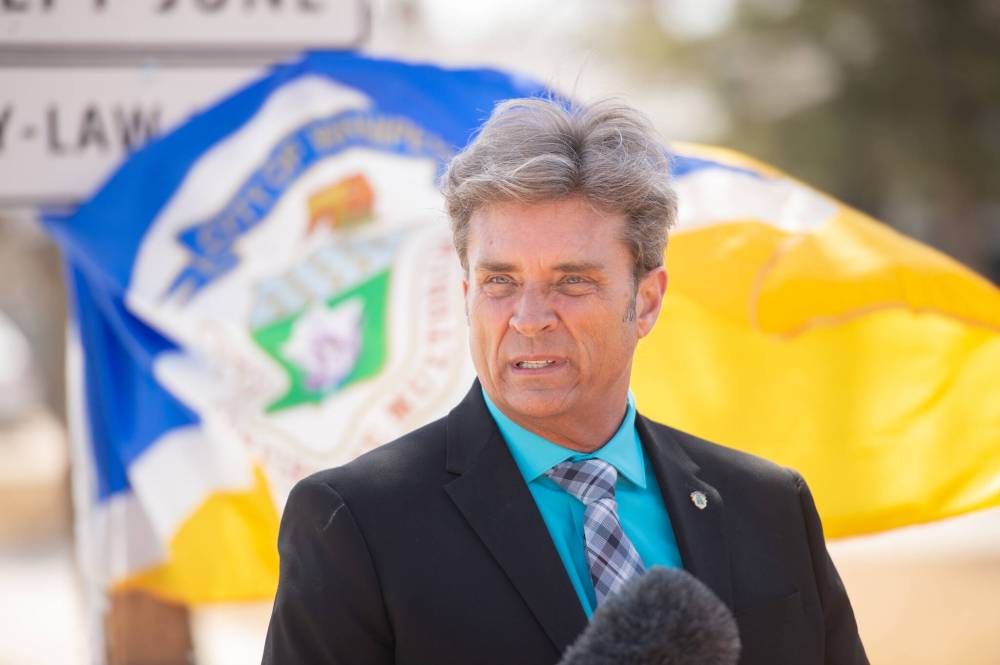Debating the ‘strong mayor’ concept
Advertisement
Read this article for free:
or
Already have an account? Log in here »
To continue reading, please subscribe:
Monthly Digital Subscription
$1 per week for 24 weeks*
- Enjoy unlimited reading on winnipegfreepress.com
- Read the E-Edition, our digital replica newspaper
- Access News Break, our award-winning app
- Play interactive puzzles
*Billed as $4 plus GST every four weeks. Offer only available to new and qualified returning subscribers. Cancel any time.
Read unlimited articles for free today:
or
Already have an account? Log in here »
Hey there, time traveller!
This article was published 27/08/2022 (919 days ago), so information in it may no longer be current.
An emerging issue in the current contest for the position of mayor is whether Winnipeg has, or needs, a “strong mayor” model for city government. There seems to be consensus that the current institutional arrangements at city hall grant too much power to the mayor and the inner circle of councillors he appoints to executive policy committee (EPC).
The critics, inside and outside of council, allege the existing strong-mayor model leads to the exclusion of non-EPC councillors from key meetings, limits their interactions with senior administrative officials and restricts timely access to such strategic information as budget documents.
All of these conditions are said to undermine the effectiveness of councillors as representatives of their wards.

MIKE SUDOMA / WINNIPEG FREE PRESS FILES
City councillor and mayoralty candidate Kevin Klein once favoured eliminating EPC, but his current platform mentions only including all councillors in budget preparation.
MIKE SUDOMA / WINNIPEG FREE PRESS FILES
City councillor and mayoralty candidate Kevin Klein once favoured eliminating EPC, but his current platform mentions only including all councillors in budget preparation.
I think complaints about one-person rule exaggerate the extent to which power is centralized in the hands of the mayor. Too much importance is assigned to the formal legal, structural and procedural relationships between the mayor and council, which are prescribed in the City of Winnipeg Charter Act passed by the provincial legislature.
Too little attention is paid to the informal dynamics of decision-making at city hall and the external relationships the city must maintain with multiple outside stakeholders.
All political systems which employ a smaller political executive group headed by a single actor — whether a mayor, a premier or a prime minister — inevitably lead to resentment and frustration by those who feel excluded. There is, however, always a need for a core executive to take the initiative, set policy and budgetary directions and accept accountability for actions and results.
If everyone gets into the act of governing, the risk is that not much action will happen and “political buck-passing” will displace accountability.
As the only councillor elected on a city-wide basis, the mayor is expected to simultaneously provide leadership in four domains: within the community, on city council, in relation to the civic administration and as the chief representative of the city in dealings with other orders of government and with external stakeholders in society.
The opportunities, obstacles and resources for leadership in each of these domains are different, which means general labels such as “strong” versus “weak” mayors are misleading.
Despite being elected to represent the whole city, the mayor casts just one of the 16 votes on council. There are no disciplined political parties on council, so there are no automatic majorities for his positions. His authority in relation to directing the administration, appointing senior civil servants and determining budgets is ambiguous and problematic.
In legal and financial terms, the city is a weak actor compared to provincial and federal governments upon which it depends for permission, support and, most importantly, money for most major initiatives. The subordinate status of the city limits its capacity to tackle such serious issues as poverty, homelessness and climate change.
This, in turn, reinforces parochialism among councillors who are forced to focus primarily on issues within their wards.
In summary, successful mayoralty leadership depends less on formal authority and more on the incumbent’s commitment to, and skills at, communication, building coalitions, negotiation and brokering deals.
Designing “better” governing arrangements involves balancing multiple values such as openness, participation, responsiveness, effectiveness, fairness, efficiency and accountability. Even so-called experts find it difficult to predict how proposed reforms will affect the relative achievement of each of those values.
Tradeoffs among them are inevitably involved. For example, the dispersal of power to councillors, to achieve stronger democracy at the community level, may come at the cost of coherence in decision-making and lead to blurred accountability.
Any meaningful reform to city governance will have an impact on power relationships at city hall and with external stakeholders, especially the provincial government, so the political acceptability of proposals must be considered. This means incremental change, not a bold redesign of city government, is the likely outcome of the debate over the strong-mayor model.
The main contenders recognize this. Glen Murray, the perceived frontrunner, has promised to conduct a broad governance review, even though a narrower study along those lines was conducted as recently as 2020. As councillor, Kevin Klein called for the elimination of EPC; as a mayoralty candidate he has so far promised only to include all councillors on the budget preparation committee.
Scott Gillingham and Robert Falcon Oulette have made different proposals to reduce the size and influence of EPC, with the declared aim of allowing all councillors greater input into the governing process.
Winnipeg needs a balanced model of city government, but there is bound to be disagreement on what that means in concrete, practical terms. In my view, the visibility of the mayor, his city-wide mandate and his powers of appointment provide the basis for influence on council, administration and external partners. The strength of that influence depends on his political skills.
Paul G. Thomas is professor emeritus of political studies at the University of Manitoba.



